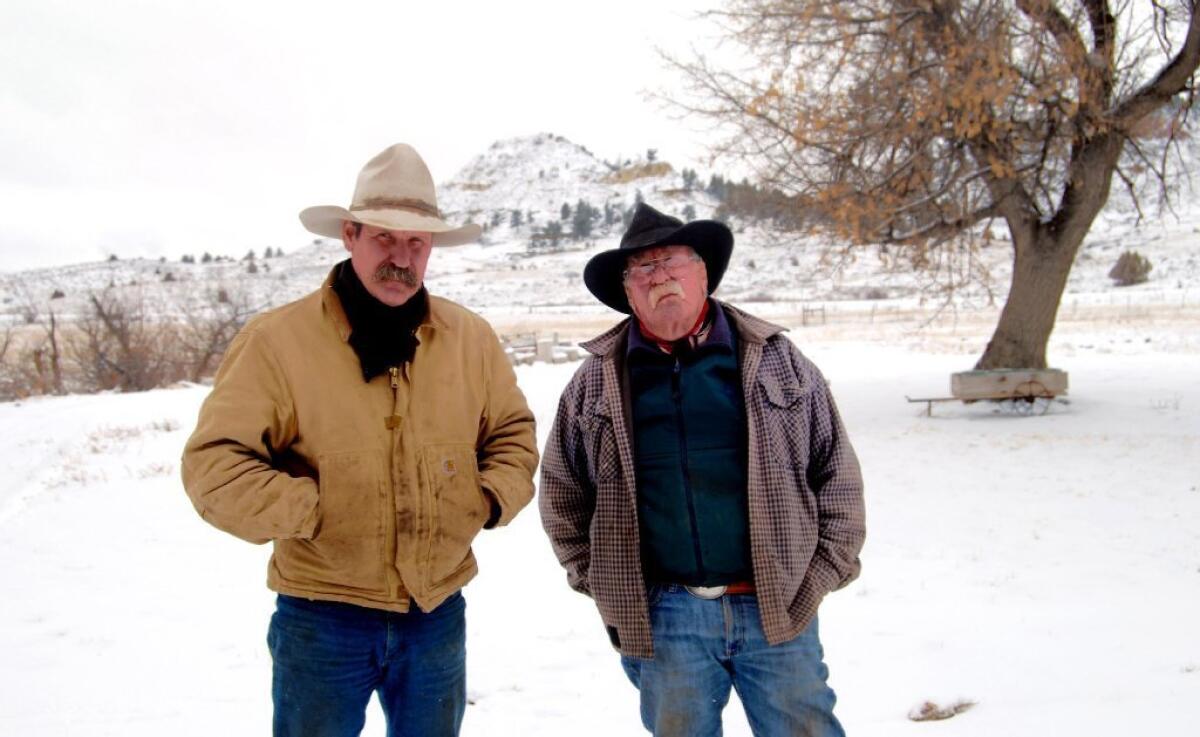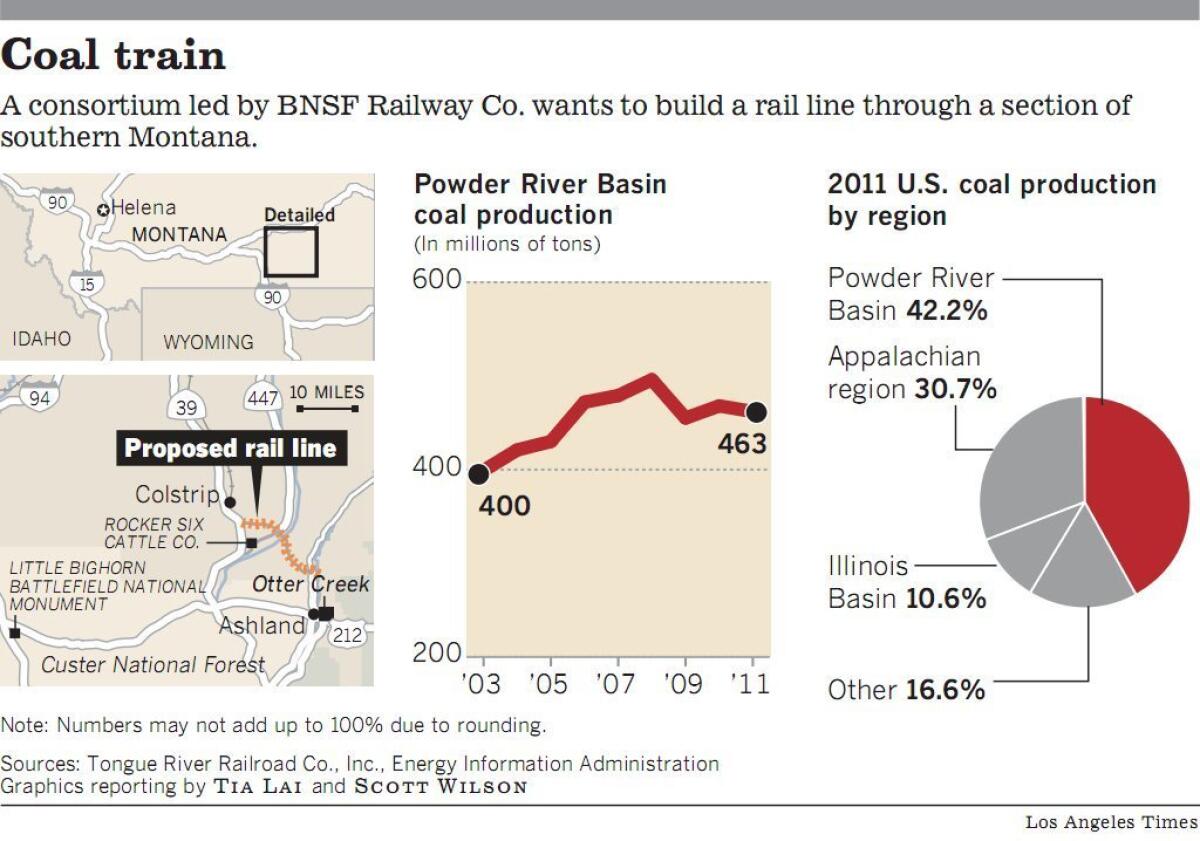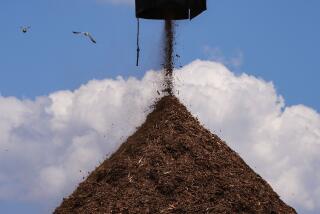In Montana, ranchers line up against coal

Ranchers Clint and Wallace McRae are worried about impacts of coal mining and transport near their ranch outside of Colstrip, Mont.
- Share via
Reporting from Colstrip, Montana — Out in these windy stretches of cottonwood and prairie grass, not far from where Lt. Col. George Armstrong Custer ran into problems at Little Bighorn, a new battle is unfolding over what future energy development in the West will look like.
Here, rancher Wallace McRae and his son, Clint, run cattle on 31,000 acres along Rosebud Creek, land their family has patrolled with horses and tamed with fences for 125 years.
They could probably go on undisturbed for 100 years more if the earth under the pastures weren’t laced with coal. A consortium led by BNSF Railway Co. wants to build a rail line to carry some of that coal to market. Nine miles of it would run through the McRae ranch.
The McRaes and some of their neighbors say the Tongue River Railroad, and a proposed coal mine at Otter Creek, puts southeast Montana and ranchers like them at risk for an energy plan that mainly benefits Asia.
“It’s going to cross our land, wreak havoc with our water, go through our towns,” Clint McRae said recently, sitting in the rustic wood house his father built, its hearth hewn from local stone.
The Montana ranchers are in the minority. For many others, coal has been one of the few good things to come out of a region so barren it sent many early homesteaders fleeing to greener lands farther west.

The Powder River Basin in Montana and Wyoming already is producing 42% of the nation’s coal, and with diminishing U.S. markets, producers are mounting a push to serve booming Asian industrial centers. Authorities are reviewing permits for four coal export terminals in Washington and Oregon that would ship up to 150 million tons of coal a year — including coal from Otter Creek — across the Pacific.
The issue has quickly become the hottest environmental debate in the Pacific Northwest. Nearly 9,000 people showed up at recent hearings on the export terminal proposed near Bellingham, Wash. More than 14,000 comments were collected, pitting those hoping for a new U.S. energy bonanza against citizens concerned about coal dust pollution and increased rail traffic.
Since the 1970s, coal has earned Montana $2.6 billion in tax revenues, and the Otter Creek Mine would bring more, along with 2,000 construction jobs and 350 mining jobs.
Those facts count to the McRaes’ non-ranching neighbors in Colstrip, where a 2,094-megawatt power plant burns coal from another nearby mine — and where the Tongue River Railroad would join the existing railroad line.
“Otter Creek is probably the biggest development opportunity our state will see in our lifetime,” said Jim Atchison, director of Southeastern Montana Development, an economic promotion group. “So even though people may be complaining about coal development and how dirty rotten bad it is, it pays a lot of bills in the state of Montana.”
The McRaes contend that the biggest costs are the ones you can’t see — the underwater aquifers that already have been polluted with coal ash.
“We have 16 springs on this ranch, and every single one of them comes out of a coal seam,” said the elder McRae, 78. “Now, they call us radical environmentalists because we want the laws enforced.”
The 42-mile-long Tongue River Railroad, they said, would bring its own problems. Seven trains a day would disrupt their cattle operations and impede efforts to fight rangeland fires
“They will cut off our cattle from water — it’s like a concrete wall,” said Clint McRae, 50. “And if we don’t fence it off, we’re going to have cattle just wiped out by trains.”
The McRaes these days tell neighbors in Colstrip it’s not just the future they need to think about; look what’s already happened to the past. A widely known cowboy poet, the elder McRae penned a verse about landmarks that disappeared when the coal men came in. “Nobody knows, or nobody cares, about things of intrinsic worth,” he wrote.
Colstrip Mayor Rose Hanser counters that coal helped make southeast Montana a habitable place.
“We probably have two or less people per square mile in this part of the country. So when you’re providing jobs for hundreds of people in a state that has less than a million residents, you are impacting the economy of an entire state,” she said.
There has been some pollution, she said, “but the trade-offs are incredible. You have a better education system, you have better infrastructure, better recreation and activities.”
Lately, the McRaes have found new allies as plans for the coal export terminals raise the prospect of a large number of coal trains running through places such as the Columbia River Gorge and the Seattle waterfront.
The city councils of Livingston, Helena and Missoula have passed resolutions asking for studies on how the region might be affected. Billings, which coal opponents say could see up to 64 trains a day, has not opposed the plan, but some of those who work downtown are becoming concerned.
“If you do the math, it’s somewhere in the magnitude of three or four times as much rail traffic as we’re experiencing now,” said Ed Gulick, a Billings architect who has worked with the Northern Plains Resource Council to block the coal shipments.
The federal Surface Transportation Board said it would study the full environmental impacts of delivering the coal at Otter Creek to market. Arch Coal, the developer at Otter Creek, has said it’s too early to say where any coal will be sold.
Clint McRae traveled to Seattle in December to testify at an Army Corps of Engineers hearing. Much of the crowd was adorned in the usual green get-ups: A man was dressed as a polar bear, and several people hoisted a giant inflated asthma inhaler. Then came a tall, somber man in boots and a Silverbelly cowboy hat.
“My name is Clint McRae. I have a ranch just south of Colstrip, Mont. My family’s lived on this ranch and ranched in that valley for 125 years,” he said, his long frame bending over to reach the microphone. “I want to make it absolutely clear: I am vehemently opposed for a private, for-profit corporation to use eminent domain to condemn my private land for a rail line to export coal to China.”
The hall erupted in cheers.
Wallace McRae said he had no intention of staying quiet if it meant losing part of his ranch. “The Corps of Engineers didn’t even have a hearing in Montana, though the only place they will condemn land for that railroad is right here,” he said. “Because they knew they were going to run through a buzz saw of people like me.”
Follow @kimmurphy on Twitter
For more news on global sustainability, go to our Global Development Watch page: latimes.com/global-development
More to Read
Sign up for Essential California
The most important California stories and recommendations in your inbox every morning.
You may occasionally receive promotional content from the Los Angeles Times.










